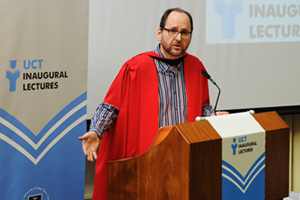Work-family balance: An unattainable dream
31 October 2013 | Story by Newsroom Myth buster: Professor Jeffrey Bagraim, who recently delivered his inaugural lecture, believes it is naive to assume that work-family balance is always desirable.
Myth buster: Professor Jeffrey Bagraim, who recently delivered his inaugural lecture, believes it is naive to assume that work-family balance is always desirable.
"It is a myth that we should always strive to keep work and family in balance."
Exposing this widely held belief as an unhealthy contemporary fiction, Professor Jeffrey Bagraim's inaugural lecture debunked other myths related to the misconception that a balance between work and family is possible.
A professor of organisational psychology in the School of Management Studies, Bagraim delivered his lecture titled Work-Family Balance: Debunking the myths and articulating the positiveon 9 October.
He pointed out that balance is important for tight-rope walkers and for riding a bike, "... but it may not be useful as a metaphor for the relationship between work and family. In fact, it may have strong negative implications for understanding that relationship".
"Work-family balance is a linguistic and conceptual trap that limits a wider understanding of the issues at the interface of work and family," he added.
Bagraim, well-known for his wit and dry humour, could not resist taking a dig at himself, noting that many scholars do not find the term '˜work-family balance' particularly useful. "They only use it as a heuristic device when on occasions like these they want to fit into the public discourse on the topic," he quipped.
Another myth that did not stand up to scrutiny is the notion that balancing work and family is the preoccupation of only women. Referring to the great strides women have made in the workplace over the years, he asked, "Perhaps women can now endeavour to have it all, but can men?"
"Nationally, representative studies in the US amongst working parents have shown consistently - for nearly a decade - an increasing rate at which the experience of work-family conflict by men exceeds that of women. So, women experience work-family conflict, but increasingly feel empowered to seek remedies and accommodations for it. Men also experience work-family conflict, but don't feel empowered to seek remedies and accommodations for it."
He cites studies that found that 80% of South African students want to get married and that 90% plan on having children. "They are concerned about the work-family conflicts they might confront in their future. They are making choices on where they will work, based on the policies and practices offered by (potential employers)." Here Bagraim dispelled yet another myth: that young people show scant regard for the pressure they might face when trying to balance work and family.
Bagraim discards the traditional view that the relationship between work and family is a win-lose situation and champions instead "a positive understanding of how multiple roles, if accumulated, can lead to positive outcomes".
He concludes, "If we work through the disabling myths and integrate the positive possibilities of an expansionist view of work and family, perhaps we'll be able to achieve success in the broadest sense of the word."
Story by Abigail Calata. Image by Michael Hammond.
 This work is licensed under a Creative Commons Attribution-NoDerivatives 4.0 International License.
This work is licensed under a Creative Commons Attribution-NoDerivatives 4.0 International License.
Please view the republishing articles page for more information.










